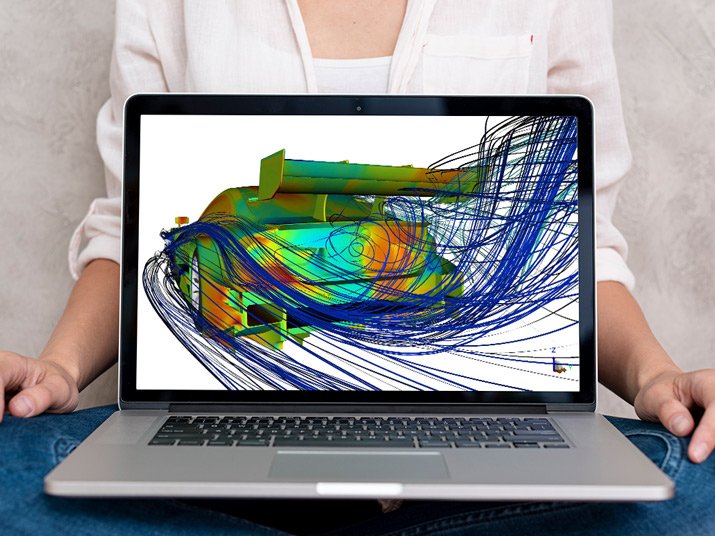Technical simulation consultants design and simulate the operation of a model in the real world using computer-generated models. The idea is to replicate key characteristics and behaviors of the model under various conditions, both manmade and natural, over time.
Let’s explore technical simulations and understand how technical simulation consultants help shape these simulations.
What does Technical Simulation Mean?
Computer simulations are software-generated models that serve as a detailed replica of what they can expect from the actual constructed design. These software-derived simulations empower designers and engineers to understand and develop efficient and effective models that can better suit their needs.
Also read: Data Center Design & Cooling: Benefits Without the Environmental Impact
How does Technical Simulation Work?

Technical simulation consultants focus on developing a model that accurately emulates a design and how it behaves in the real world. The simulations use intuitive modeling software to construct a digital rendering for the visual mock-up and testing process. The rendered design includes detailed rules, resources, constraints, and timings to help engineers make sense.
The simulations are constructed realistically in a digital environment, complete with their own set of rules that closely resemble the real space that the design will occupy in the real world. These simulations are tested rigorously in these digital environments to prove and enhance their use case. They are also tested repeatedly for points of failure by simulating various scenarios to ensure it conforms to regulations and meets all standards.
Technical simulations can be used in a variety of applications, from footfall in a supermarket to wind resistance of a skyscraper. Technical simulation consultants design simulations to understand, identify, and solve challenges and make the design much more efficient and effective for the intended use.
The Role of Technical Simulation Consultants
Technical simulations are a great way to evaluate the effect of the operation, performance, efficiency, and scalability of a design. Technical simulation consultants use it to mint new procedures, understand process changes, and identify areas of capital investment.
Simulations are an excellent tool to research and develop your design concepts into reality. Technical simulations by qualified technical simulation consultants allow organizations to measure factors like efficiency, resource utilization, productivity throughput, storage and staffing needs, choke points and bottlenecks, stress thresholds, and more.
Where can Technical Simulations be Used?
With technical simulation, any system or process that comprises a flow of events can be simulated; in essence, if you can put down the process in a flowchart, it can be analyzed and replicated in a digital model. But technical simulation is best utilized when applied to a process or equipment that transforms over time and has other external variables impacting it.
Using simulations to model designs allows technical simulation consultants to gain insights from a complex and dynamic system which is not the case with other methods.
Also read: Role of Meshing and Its effect on your FEA and CFD Simulation
What are the Types of Technical Simulations?
Technical simulation can be dissected distinctly into four types, namely-
1. Dynamic Simulation:
Dynamic simulation is the prime example of technical simulation as it deals with modeling a system moving through an environment.
2. Discrete Event Simulation:
Discrete event simulation deals with modeling a system as it progresses through time.
3. Process Simulation:
Process simulation involves models that go through a specific chain of processes.
4. Risk Analysis Simulation:
Also known as the “Monte Carlo Simulation,” it is a method of modeling that helps technical simulation consultants assess risks related to your system.
Also read: Should Manufacturers Adopt CFD for Turbomachinery Parts?
So, What are the Advantages of Technical Simulations?
Technical simulations offer a broad range of advantages. Some of them are-
-
Negligible financial risk:
With qualified technical simulation consultants, the sky’s the limit. Designers and engineers can build simulations that conform to and mimic their requirements at zero financial risk.
-
Stress testing & long-term impact assessment:
One of the major innovations digital simulations bring is allowing designers to test their designs. It also enables engineers and designers to check the long-term impact on their design over time.
-
Granular cost assessment:
Technical simulations also allow for detailed estimation of construction costs and time. This foresight significantly reduces wastage and prevents cost overruns.
-
Environmental impact assessment:
Sustainability has become a major area of concern for many states and corporations alike. Technical simulations allow for an in-depth analysis of environmental impacts during and after the construction of projects helping us keep our planet green.
-
Unplanned event assessment:
Technical simulation also allows designers to go beyond the ordinary and test out unplanned events such as a building’s ability to withstand a storm or a fuselage’s ability to withstand an impact.
-
Improve efficiency:
Efficiency is also a critical aspect that technical simulations are known to predict accurately. The simulation consultants can also tweak the design to eke out maximum efficiency without compromising on any other front.
-
Improve stakeholder confidence:
Technical simulations also produce grounded reproductions of designs that can be used to improve confidence among stakeholders.
-
Satisfy regulators:
Technical simulations can be built and modified to meet all regulatory needs. Technical simulation consultants often collaborate closely with regulators to design mechanically and structurally sound models that comply with statutes to ensure a safe and sustainable design.
Conclusion
As we explored, technical simulations are employed for a spectrum of applications across various industries and offer numerous advantages, revolutionizing the process flow and preserving time and expenditure while being able to test ideas and theories before executing them.
Whether it’s testing concepts, evaluating procedural performance, or identifying the lifespan of a system, simulation is an invaluable tool for many organizations and businesses.
While you’re here, check out Mechartes, a leading CFD company specializing in optimal engineering and process designs aimed at solving complex engineering problems.


 Share
Share  facebook
facebook